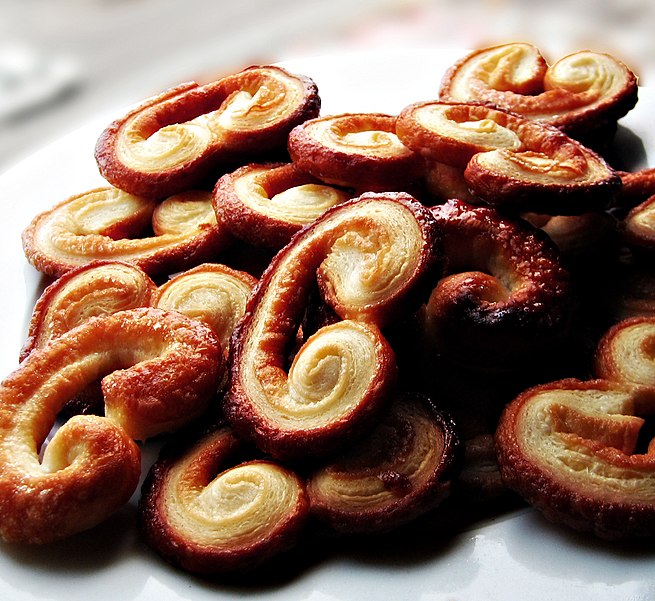Main Difference
The main difference between Pastry and Cookie is that the Pastry is a name given to various kinds of baked products and Cookie is a baked treat
-
Pastry
Pastry is a dough of flour, water and shortening (solid fats, including butter) that may be savoury or sweetened. Sweetened pastries are often described as bakers’ confectionery. The word “pastries” suggests many kinds of baked products made from ingredients such as flour, sugar, milk, butter, shortening, baking powder, and eggs. Small tarts and other sweet baked products are called pastries. The French word pâtisserie is also used in English (with or without the accent) for the same foods. Common pastry dishes include pies, tarts, quiches and pasties.Pastry can also refer to the pastry dough, from which such baked products are made. Pastry dough is rolled out thinly and used as a base for baked products.
Pastry is differentiated from bread by having a higher fat content, which contributes to a flaky or crumbly texture. A good pastry is light and airy and fatty, but firm enough to support the weight of the filling. When making a shortcrust pastry, care must be taken to blend the fat and flour thoroughly before adding any liquid. This ensures that the flour granules are adequately coated with fat and less likely to develop gluten. On the other hand, overmixing results in long gluten strands that toughen the pastry. In other types of pastry such as Danish pastry and croissants, the characteristic flaky texture is achieved by repeatedly rolling out a dough similar to that for yeast bread, spreading it with butter, and folding it to produce many thin layers.
-
Cookie
A cookie is a baked or cooked food that is small, flat and sweet. It usually contains flour, sugar and some type of oil or fat. It may include other ingredients such as raisins, oats, chocolate chips, nuts, etc.
In most English-speaking countries except for the United States and Canada, crisp cookies are called biscuits. Chewier biscuits are sometimes called cookies even in the United Kingdom. Some cookies may also be named by their shape, such as date squares or bars.
Cookies or biscuits may be mass-produced in factories, made in small bakeries or homemade. Biscuit or cookie variants include sandwich biscuits, such as custard creams, Jammie Dodgers, Bourbons and Oreos, with marshmallow or jam filling and sometimes dipped in chocolate or another sweet coating. Cookies are often served with beverages such as milk, coffee or tea. Factory-made cookies are sold in grocery stores, convenience stores and vending machines. Fresh-baked cookies are sold at bakeries and coffeehouses, with the latter ranging from small business-sized establishments to multinational corporations such as Starbucks.
-
Pastry (noun)
A baked food group which contains items made from flour and fat pastes such as pie crust; also tarts, bear claws, napoleons, puff pastries, etc.
“That pastry shop sells not just pastries, but all kinds of baked goods.”
-
Pastry (noun)
The type of light flour-based dough used in pastries.
-
Pastry (noun)
The place where pastry is made.
-
Pastry (noun)
The act or art of making pastry.
-
Cookie (noun)
a small, flat, baked good which is either crisp or soft but firm
“biscuit|bickie|q2=UK, Australia”
-
Cookie (noun)
a sweet baked good (as in the previous sense) which (usually) has chocolate chips, fruit, nuts{{,}} etc. baked into it
-
Cookie (noun)
a bun
-
Cookie (noun)
an HTTP cookie, web cookie
-
Cookie (noun)
a magic cookie
-
Cookie (noun)
a young, attractive woman
-
Cookie (noun)
the female genitalia
-
Cookie (noun)
Affectionate name for a cook.
-
Cookie (noun)
a cucoloris
-
Cookie (verb)
To send a cookie to (a user, computer, etc.).
-
Cookie (noun)
a sweet biscuit.
-
Cookie (noun)
a person of a specified kind
“she’s a tough cookie”
-
Cookie (noun)
a plain bun.
-
Cookie (noun)
a packet of data sent by an Internet server to a browser, which is returned by the browser each time it subsequently accesses the same server, used to identify the user or track their access to the server.

